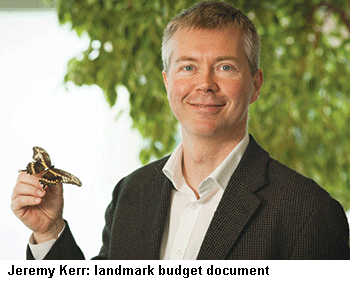 CANADA’S GOVERNMENT HAS PLEDGED TO increase research and science funding by nearly C$4 billion (Rs.19,867 crore) over the next five years, winning plaudits from academics and universities. Finance minister Bill Morneau says the additional funding announced in the Liberal government’s budget would include an extra C$925 million over five years for the country’s three research councils, plus C$235 million per year in subsequent years. The budget will also include a new investment of C$275 million over five years to create a “tri-council fund” to support “international, interdisciplinary, fast-breaking and higher-risk research”.
CANADA’S GOVERNMENT HAS PLEDGED TO increase research and science funding by nearly C$4 billion (Rs.19,867 crore) over the next five years, winning plaudits from academics and universities. Finance minister Bill Morneau says the additional funding announced in the Liberal government’s budget would include an extra C$925 million over five years for the country’s three research councils, plus C$235 million per year in subsequent years. The budget will also include a new investment of C$275 million over five years to create a “tri-council fund” to support “international, interdisciplinary, fast-breaking and higher-risk research”.
Together, the two investments will increase the granting councils’ annual budgets for fundamental research by “over 25 percent when they reach their peak in three years’ time,” according to budget documents. While the pledges fall short of the recommendations in last year’s Naylor report, which called for annual funding for basic research to rise by more than a third or C$1.3 billion within four years, the new funding represents “the single largest investment in fundamental research in Canadian history”, according to Morneau.
The Canadian Foundation for Innovation, which funds research infrastructure and equipment, will receive an extra C$763 million over five years. Overall, it will receive regular annual funding of C$462 million (Rs.2,294 crore) a year to allow better planning.
Canada’s research chairs programme will also receive a C$210 million increase in funding over five years, targeted at increasing the number of chairs provided to early career researchers and women. The announcements are particularly welcome given that last year’s budget announced a freeze in basic research funding.
Jeremy Kerr, university research chair in macroecology and conservation at the University of Ottawa, describes the budget a “landmark” document, stating that the various funding boosts to science amount to “a truly massive increase of C$3.9 billion over the next five years”.
Prof. Kerr, who last year co-authored a report for the Global Young Academy, an international society of early career scientists, which argued that blue-skies research in Canada had “collapsed”, adds that for the “first time ever, there is actually five years of budgetary planning and growth around science” in the budget.
(Excerpted and adapted from The Economist and Times Higher Education)